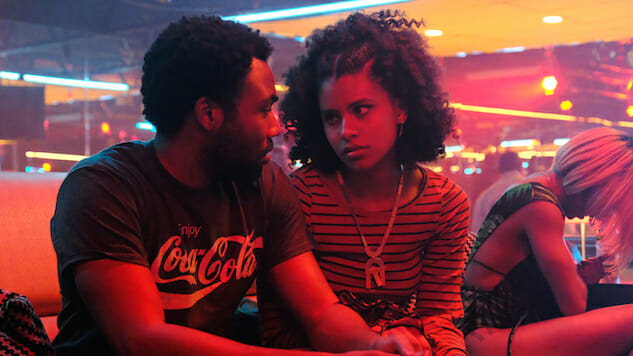Atlanta: Mo’ Money, Same Problems
(Episode 2.03)
Photo: Guy D'Alema/FX
Last week, Atlanta showed us what happens when you give a taste of cash to someone who isn’t ready for it and deny that taste to someone too thirsty for it. With “Money Bag Shawty,” the series suggests that money magnifies the essence of the person who has it: Earn (creator Donald Glover) has money, so of course the (often self-positioned) underdog is going to push his ego onto it.
This money comes from album sales. Alfred (Brian Tyree Henry) pissed off a white mom with his lyrics, which means that she went to Facebook with her self-righteousness. A white mom getting choked up at the very mention of Colin Kaepernick is already hilarious, especially when it’s revealed that the (vertical) viral video only helped sales, but its queasy familiarity to me as a white Texan made me want to go through another social media purge of half the people I knew in high school.
So Earn’s got some cash. And, if Alfred is to be believed, Atlanta is a town that only cares if you have money. That means it’s time for an all-out date night with Van (Zazie Beetz), showing his town and his girl that he can conspicuously consume with the best of them. Of course, Earn can’t even buy a homeless man a meal without welcoming disrespect, so when the manager puts this theory to the test, he’s bound for disappointment.
Money can’t change a stuntee into a stunter, whether at a strip club, a movie theater, or a hookah bar. Part of the issue is straight-up racism: Earn is constantly discriminated against when he tries to pay with a $100 bill. Part of it’s personal: Van rubs it in, the sympathetic heckler (a hard-to-nail dichotomy) to Earn’s constant victim. Or, put another way, the schlimazel to Earn’s schlemiel. She can joke along with the world, tricking him into thinking that the phrase “caught red-handed” has a racist origin, or merely absorb some of the collateral damage, like when she spends some of his money on a “pity dance” from the world’s skinniest, least-gyrating stripper. No matter what, Earn is the butt of the world’s joke, and Van is right there beside him.
These (old, Jewish, humorous) ideas about a person’s unchanging, almost fated relationship with the rest of the world carries over to the kind of posturing “Money Bag Shawty” portrays. The point is that a tiger can’t change his stripes and a nerd can’t change his corny T-shirt. It’s not quite a question of confidence, either: As Alfred says — in a line quoted by Tad Friend in his pointed New Yorker profile of Glover — “You gotta act like you better than other niggas so they treat you better than other niggas.” Darius (Lakeith Stanfield) chimes in, “Otherwise, you just look like… another nigga,” before attempting to light some money on fire. Darius’ would-be pyrotechnics and Tracy’s (Khris Davis) attempts to hire a dancer only make it more obvious that a little bit of money only enhances who these characters already are.
This is something we see earlier in the episode, when Alfred and Darius stop by the recording studio to see Clark County (RJ Walker), of last episode’s “Yoohoo” fame. We find out that the rapper doesn’t drink and doesn’t smoke, but he’ll have his engineer roughed up without blinking an eye. Some problems just come from the person, not their vices. No matter someone’s intoxicant of choice, be it weed, liquor, or money, Atlanta has no faith in people changing—not really, anyways.
It’s a stance that can read as optimistic or cynical, depending on where you stand. On one hand, people aren’t going to get a better lot in life because the personal and systemic factors at play are going to shove them right back to where they started. On the other, no matter how bad or good things get for someone, there’s the reassuring idea that they’re always inherently themselves. This message comes across through the various vignettes that comprise Earn’s trials, as well as in the shots that begin and end these trials. Van leans her head on Earn during a disheartened Uber ride after their date night implodes, and in the back of a limousine after Earn fails to beat Michael Vick in a strip club-adjacent foot race (one encapsulated in a hilarious freezeframe). There is solidarity built into this cycle: If money can’t get you out, loyalty is what must make it bearable.
Jacob Oller is a writer and film critic whose writing has appeared in The Guardian, Playboy, Roger Ebert, Film School Rejects, Chicagoist, Vague Visages, and other publications. He lives in Chicago, plays Dungeons and Dragons, and struggles not to kill his two cats daily. You can follow him on Twitter here: @jacoboller.







































